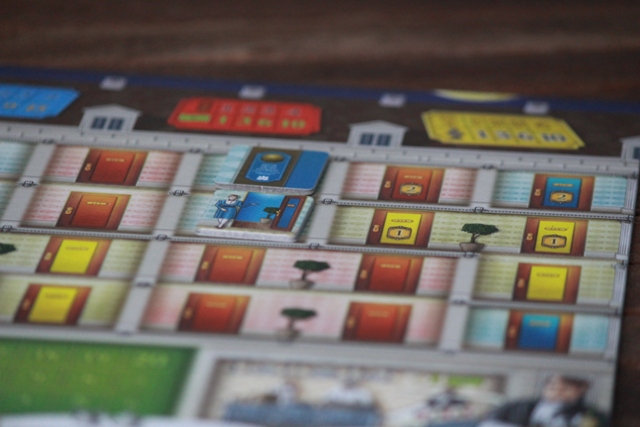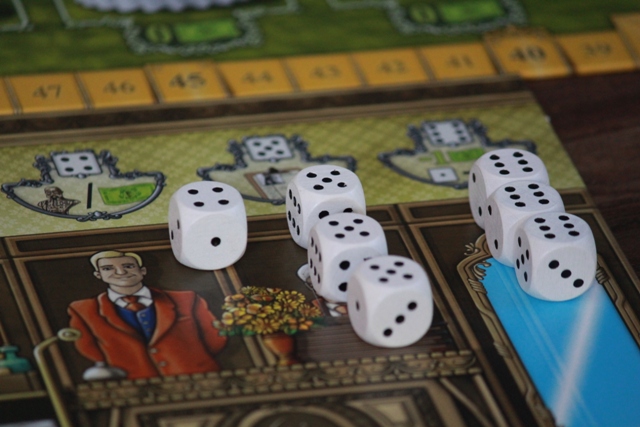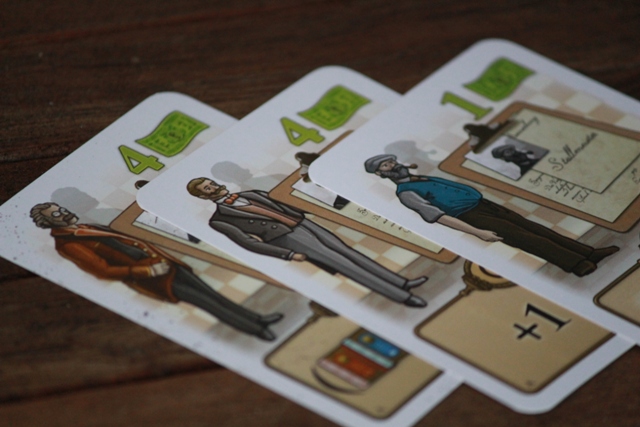Grand Austria Hotel Review
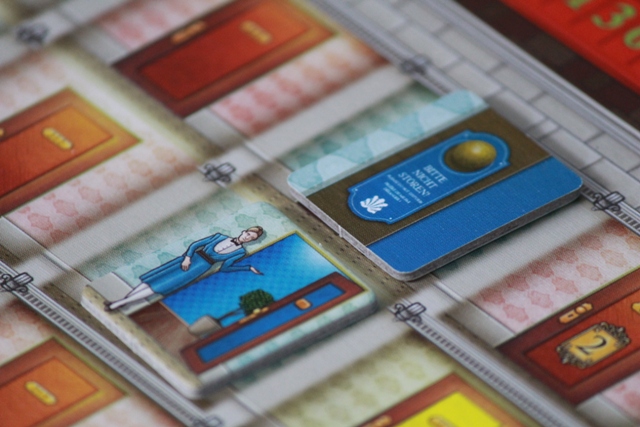
What is it? Oh the life of a hotelier, dealing with pernickety politicians and temperamental tourists. There's never enough strudel and guests always want wine when all you have is coffee. And to top it all off, the Emperor will be visiting in three days and that dude is as fickle as Anton Ego.
Dice and the Euro genre, it’s like being in High School all over again. Dice just wanna have fun, live for the moment, reach for stars even if it means public failure. But Euros, they spend their free time studying, achieve stellar grades and more than likely have a ‘life map’ as a plan for the next ten years. It’s the world of Batman v Superman or West Side Story – certain divides were never meant to be crossed.
That is until a free-spirited Die saw a beautiful Euro from across the room and said ‘to hell with these separate worlds’. And so a relationship began that broke all the rules. At first, their families were outraged – chance and determinism, nothing good could come from such an unholy union. As so often happens, their union saw the birth of a bouncing baby hybrid, a child so beautiful it ushered in a period of reconciliation.
There are still remnants of that old school line of thinking, but for the most part Grand Austria Hotel arrives to an accepting world that looks beyond labels. Also, I may have been exaggerating the freshness of this love-story just a tad. In truth, dice allocation has been infiltrating the ranks of the more strategy focused boardgames for quite some time. Kingsburg, Alien Frontiers, Railroad Dice, Troyes and countless others have all attempted to harness the very particular sense of satisfaction that comes from rolling dice and the randomness inherent, with the kind of control that allows for long-term planning and the implementation of carefully considered cunning.
This could be Heaven or this could be Hell
Looking to put their own spin on matters is Mayfair Games with Grand Austria Hotel. Have designers Virginio Gigli and Simone Luciani managed to craft a dice-driven mechanic that sets itself apart? For those not up to the task of tolerating my standard waffle, the answer is yes. Orleans may still be the best Euro I’ve played in the last six months, but Grand Austria Hotel lives up to the standards set by its namesake in Vienna. Not quite 5-star, but a luxurious getaway nonetheless.
Tourism is booming and a pretty penny is in the offing for the most resourceful hotel owner as well as the favour of the Emperor. Your guests will come for the delectable strudel and the aromatic coffee, but they’ll stay for the stately elegance of the exclusive suites. The more prestigious the guest, the greater the reward!
Grand Austria Hotel plays in two distinct parts. There’s the resources management which is strongly suggestive of Lords of Waterdeep, only with quests replaced by demanding guests and cubes for strudel, coffee, cake and wine rather than clerics, fighters, rogues and wizards. And then there’s the role selection using dice which is really the…er…bread and butter of the game. I’ll summarise the former in a bit, but it’s the latter that will either live up to your dreams of satin sheets, or have you reaching for the phone to cancel your reservation.
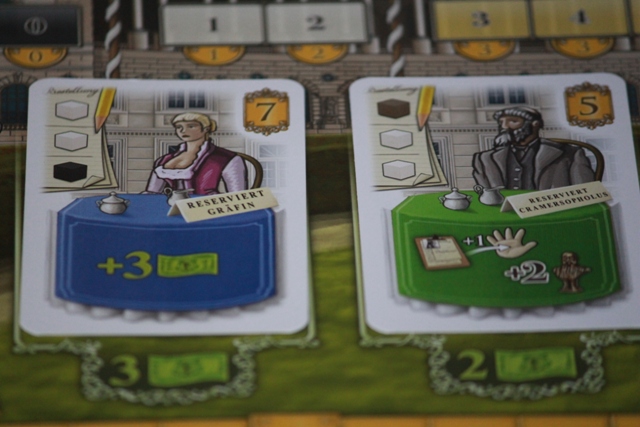
Complete Ms Grafin’s order and you’ll get 3 Krone. The gentleman on the right isn’t picky about rooms, he’ll stay in any colour.
Your café can retain up to three guests, each of which will display a hankering for a particular combination of culinary delights. Mr Herzog may show a weakness for two portions of strudel washed down with two cups of coffee and should you manage to fill his order he’ll gladly take a room in your hotel provided you have one prepared for him. And as a thanks for your excellent service, he’ll grant you a bonus. In this case, you’ll be able to recruit a new staff member at no cost. In turn, that new Sommelier might provide you with extra wine. Or perhaps the Porter, who allows you to instantly complete a guest’s order without costing you valuable resources.
But the aspect of the game that provides both the most fun and the most number of head-scratching moments, is the dice allocation. Enter the Action Board with its six enticing spaces. Six spaces? Why that’s the same as the number of possible results from a six-sided die! You lot are super observant! At the start of each of the game’s seven rounds, the first player will roll a handful of dice – 10 for two players, 12 for three and 14 for four. Each result is placed on the matching space and becomes available as a possible action. Those spaces range from providing wine and coffee to recruiting new staff members, receiving Krone or readying a room in your hotel.
As an example, the space showing one pip allows you to take cake and/or strudel. If there was one die on that space on a player’s turn, they could remove a die to indicate an action had been taken, and would receive one portion of strudel. No more die on that space would now mean that no more cake/strudel for anyone else. If though that space contained 3 die, that player could take 3 portions of strudel or 2 portions of strudel and 1 portion of cake. One die would be removed to indicate the action has been taken, leaving 2 dice for other players to utilise.
But don’t fret, if any sixes have been rolled these act as wilds of a sort. 3 sixes could be used in place of a lonely single die on the first action space, or even for a space with no available die. Using sixes will cost you a Krone however and money’s too tight to mention. You could instead choose to pass – wait until all remaining players have completed both of their two available actions, remove one die from the pool and reroll those remaining. Ah yes, turn order. Grand Austria Hotel uses a snaking order – each player has two turns per round, with the last player immediately taking a second turn and back on down the line. So if you’re the first player of four in any given round, you’ll typically be waiting 6 turns until you can act again.
Let’s touch on the last few major rule aspects. Each players hotel board has 4 levels of 5 suites each, resplendent in red, yellow and blue. Rooms on the higher floors award more victory points, but are also more expensive to prepare. Those colours also correspond to the guests, so a red guest will only stay in a red room (although Green guests will stay anywhere). The Emperor track is scored three times, awarding points to those furthest along as well as bonus favours, or nasty surprises for those who ignore the Emperor’s wishes. Lastly, Politics cards provide bonus objectives that can be claimed three times each for a healthy injection of victory points – for example the first player who accumulates 20 Krone will receive 15 points, the next 10 and the last 5.
If you cannot abide by a review that leaves out some of the fine print of the rules, you’re more than welcome to download them here. There are absolutely additional rules that grant the game even more nuance, but I’m giving you the benefit of the doubt in drawing what you need to from what’s been explained here. I’m far more concerned with telling you why Grand Austria works as well as it does.
Such a lovely place (Such a lovely place)
Dice can be a genuine boon for many a Euro. Variability, suspense, adaptability – these are all qualities that elevate the experience. But it’s also incredibly easy to err too far onto the side of randomness, to the point where challenge morphs into aggravation. What Grand Austria does so well is to front-load that aspect of chance. Instead of choosing to do an action and then rolling the dice to ascertain how successful your endeavors proved, you know precisely what the results of an action will be. The strength of that action is a known and if necessary once per turn you can spend a Krone to increase the strength of an action by an additional die. As invigoratingly terrifying as it can be to have your strategy rest on the result of a single roll, that’s not something one should need to experience in hotel management. Defeating dragons, yes, baking one last cake in the kitchen, no.
The experience of playing Grand Austria Hotel is the essence of a great strategy game, distilled for maximum potency. Limited time, multiple strands to keep track of, any number of paths that seem equally adept at achieving victory and the nagging sense that you’re always missing something crucial. And most importantly, knowing what to sacrifice and when. How far along the Emperor track is far enough? Should you focus on playing as many powerful staff cards as you can, many of them providing end game bonuses, or focus on being the first to achieve a Politics card? Something’s gotta give, and knowing what that is will often prove the difference between victory and defeat.
There’s so much I haven’t touched on – how tight the flow of money is, how each time the Emperor track scores it’ll push you a number of spaces back, the bonuses that arise from having certain groupings of your rooms occupied, the various free actions you can perform. And yet even with so much to keep track of, I wouldn’t label this as a heavy Euro. It’s actually rather easy to understand and relatively quick to learn – though a completed game doesn’t leave you feeling drained, you’ll have had a good mental workout.
But every hotel has it’s share of Rock Star incidents, TVs thrown from windows and carpets doused in mini-bar Jack Daniels and as much as I wish Grand Austria were exempt from such behaviour, I’d be remiss in failing to point out two potentially grouchy bugbears. I mentioned earlier that the turn-order snaked and that downtime for the first player can be substantial. Two and three really are the ideal player counts, although I’d certainly not turn down a game of four if everyone at the table was a Hotel veteran. The designers have devised a turn-order variant, but without having tested it I can’t speak to its efficacy.
The other potential stumbling block is the wildly varying powers of the staff cards. Players all start the game with a hand of six and may well finish the game without having drawn a single additional staff card. If you’re dealt a stronger opening hand, the advantage over your opponents can be significant. Thankfully, the game offers a draft-style resolution to this problem which renders it, at least for me, a relative non issue.
An appeal to art designers everywhere – please, for the love of all strudel don’t sacrifice readability for visual flair. There are 48 staff cards and an exhaustive list in the rulebook for the special ability of each, and I lost count of the time wasted in attempting to decipher Pferdenecht from Personalchef. The iconography does become familiar fairly quickly so it’s not an issue that will arise after multiple plays, but first impressions count.
When the last crumb of sinfully rich cake has been consumed, when satin sheets have been turned down and mints from pillows eaten, Grand Austria Hotel proved a delightful experience that will see me returning often. Whether it’s discovering how effectively certain staff and guest cards combine, that heady satisfaction of watching a perfectly paced strategy come to fruition or the simple enjoyment of how well the various mechanics click into place, Luciani and Gigli are the eager concierges who ensured my stay was a memorable one.
Review Copy of Grand Austria Hotel was kindly provided by Boardgames.co.za for this article.

Pros:
- Fantastic dice allocation mechanic
- Interesting card combos
- Fun theme
- Complex but easy to get into
Cons:
- Downtime with 4 may prove difficult for some
- Font choices on the staff cards

